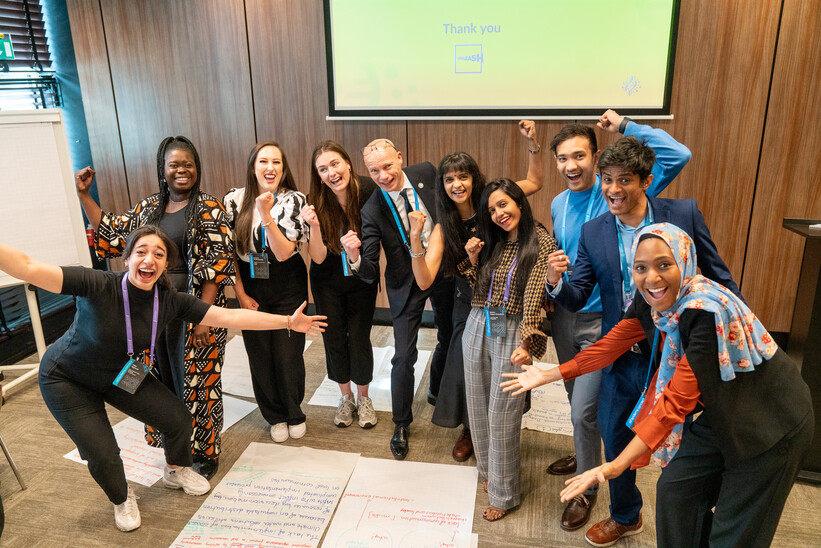
Valuable connections and experience gained as first CONNECT Award winner at the 2023 All Systems Connect symposium.
Published on: 15/06/2023
Guest blog written by Hadi Toure Guindo
In 2022, I applied for IRC’s Ton Schouten Award but unfortunately, I wasn’t selected. Therefore, being approached by IRC in March 2023 and learn that I was the first winner of their new CONNECT Award, as unexpected as it was, was very rewarding. As a female water engineer, I love sharing my work experiences to inspire fellow young professionals, especially those from my home country Mali. After hearing that I was selected for this award, I realised how much of an impact I was making by communicating about my passion for water and environmental engineering on social media, especially on LinkedIn.
The CONNECT Award prize was to participate in IRC’s All Systems Connect Symposium and I did not hesitate one moment and joined in. My task was to be part of the Make Change Design Sprints and with my fellow ‘sprinters’ find solutions to pressing challenges in the water, sanitation and hygiene sector with the help of allies beyond it. Not an easy challenge! I highly valued the experience and the connections I was able to make during this trip, they will last me a lifetime. I have gained so much respect for water, sanitation, climate and youth advocates that lobby for paradigm shifts on accelerating good practices to achieve the SDGs.
I joined a strong team with Hajar Yagkoubi, Spurthi Kolipaka, Saoirse Moriarty, Diandra ni Bhuachalla, Valéry Molay and Shomy Hasan Chowdhury at the All Systems Connect Symposium. These ladies are current and formal UN delegates and WASH, health, and climate activists. As I read their bios prior to our first online meeting, before flying to the Netherlands, I was very impressed by their accomplishments as young professionals. I have a slightly different background and am more used to communicating on practical problems through my work at the water utility. I therefore took part in the sprint with the intention of bringing in my experience as a very down-to-earth, young professional from Mali.
The big problem that my Make Change Design Sprint group identified is the lack of implementation of water and climate solutions due to lack of accountability, vested interest and lack of engagement. A very tough issue for a one-size fits all innovative solution!
We went through various phases that could be summarized in a few words: Excitement, adrenaline, doubts, disappointment……And through all of this we wanted to keep our authenticity. We had picked a complex issue that was not easy to solve, and we had the responsibility to pitch a solution we couldn’t agree on. It is quite something to utter a strong critical statement about a failing system in front of a symposium audience consisting of government leaders and decision-makers that ARE part of that system.
After many discussions, disagreements, and compromises, we decided to get onto the stage and talk about the process of our sprint, which was as an analogy of the bumpy road that is taken in reality to bring about positive change in the world and provoke a paradigm shift across government, policy, researchers and practitioners to accelerate the SDGs.
Next to the Design Sprints I was also interviewed by Ikenna Azuike, the symposium host and moderator. Ikenna really challenged me by going off-script! As many non-native young female public speakers, I had prepared my answers to his questions. However, we ended up having a very spontaneous conversation that was appreciated by the audience. Many agreed on my Toilet Talks Flush It suggestion which was to get rid of powerpoint slides with too many words.
As Henk Ovink, the Dutch Special Envoy for Water and mentor of the young sprinters, suggested during our various interactions and feedback sessions, the change needed for shifting the paradigm has to come from inside the system. Likewise, the design thinking and problem-centred approach (rather than solution-oriented) facilitated by UNLEASH has really inspired me in how I will communicate in future interventions.
Not get too philosophical, this translates for me, a utility worker and university lecturer, into 2 key lessons:
Despite all the work for the All Systems Connect Symposium, I still managed to meet key actors in the WASH and climate sector, produce two TikTok group dancing videos (shoutout to Coach Spurthi), throw a toilet roll to an audience and zipline over the North Sea to release all the tension!
This year I participated in the 2023 UN Water Conference as part of a fellowship with IWA and Grundfos. I will continue to advocate and share knowledge and experience with young professionals through webinars and also during the IWA Water Development Congress in Kigali in December 2023.
Another activity I will be participating in is the Water Communication workshop organised by World Water Week/SIWI in June 2023. During a Q&A session I will share my perspectives on how to promote local ownership by making science and research more inclusive in communities in the global south.
Also, I hope to spend some time doing inclusive research with the youth in rural and semi-urban communities. I currently work on mobilising finance for a multidisciplinary citizen-science project that will demonstrate the importance of recognising the traditional knowledge of communities living on the riverbank in Mali.
At IRC we have strong opinions and we value honest and frank discussion, so you won't be surprised to hear that not all the opinions on this site represent our official policy.